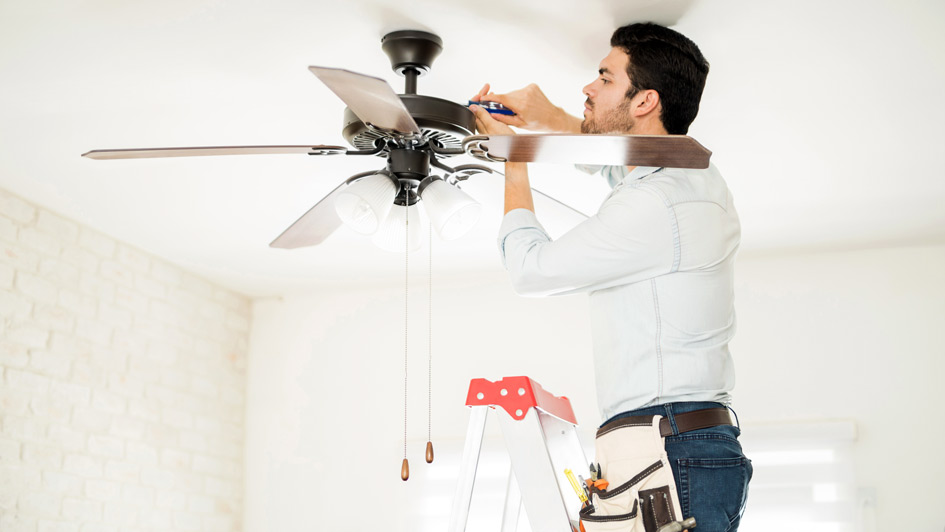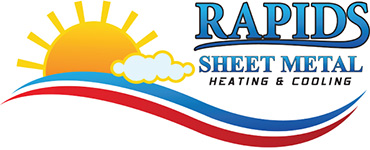
Ceiling fans are one of the most overlooked ways to make your home more comfortable and cut energy costs. By boosting air circulation and assisting your HVAC system, ceiling fans and energy efficiency are truly a match made in heaven. They offer a cost-effective, eco-friendly way to maintain your comfort in hot weather while lessening strain on your AC—helping you avoid unnecessary air conditioning repair.
In this blog, the experts at Rapids Sheet Metal Works Inc discuss how ceiling fans can keep you cool while increasing your HVAC efficiency. We'll also offer some HVAC efficiency tips that make the most of ceiling fans.
Comfort vs. Temperature: Getting Comfortable with the Wind-Chill Effect Indoors
Ceiling fans don’t actually change the room’s temperature—they make you feel cooler by blowing air across your skin. This is called the wind-chill effect, and it can make a room feel up to 4 degrees cooler without adjusting the thermostat. That means you remain cool and enjoy the benefits of indoor air circulation from your ceiling fan while minimizing air conditioner use—helping reduce your electric bill in summer.
The Best of Both: Why You Should Use Fans and Air Conditioning Together
There are several advantages to using ceiling fans and air conditioning together, especially during the warmer months. By pairing both, you maximize HVAC efficiency and maintain a comfortable indoor temperature with less strain from your cooling system.
Top perks of using ceiling fans and AC together:
- Ceiling fans help lower HVAC load by spreading cool air more evenly throughout rooms in your home. Decreasing HVAC stress is important, because it can help you avoid a breakdown that may lead to premature AC or furnace installation.
- Using overhead fans improves your indoor comfort by getting rid of warm pockets and improving air movement.
- Combining ceiling fans and AC can lower your utility usage. If you have a home automation system, you can even adjust your smart thermostat settings to set the temperature higher while your ceiling fan is running.
Clockwise vs. Counterclockwise Ceiling Fan Rotation: What Direction to Spin in Summer and Winter?
To maximize the benefits of your ceiling fans year-round, it’s important to set the blades to rotate in the proper direction for the season. The direction influences how air flows, which can either make you feel cooler or push warm air downward so you feel warmer.
When it's best to spin ceiling fans counterclockwise
When it's hot outside, ceiling fans should turn counterclockwise at a faster setting. This creates a breeze that forces cool air down, amplifying the wind-chill effect and causing you to feel cooler.
When to rotate ceiling fans clockwise
In the winter, set your fan to spin clockwise on a slower speed. This gently pulls cool air upward and pushes warm air near the ceiling down toward you, helping you feel warmer without touching your thermostat.
What Type of Ceiling Fan Is Best
Picking the best ceiling fan depends on a few key factors, such as blade design, airflow rating and room dimensions. First, look for fans with a good blend of ECFM airflow and blade pitch to provide efficient air circulation in your space:
- ECFM refers to how much air a fan moves—the cubic feet per minute, or CFM—per watt of electricity consumed. Fans with greater ECFM are the most energy efficient.
- Blade pitch is the incline of the blades. A steeper blade pitch moves more air but can also put extra load on the motor.
Also, consider room size when sizing a ceiling fan—a fan that’s too small won’t circulate sufficient air, while one that’s too large may be overpowering for the room.
Boost Your HVAC Efficiency With the Experts from Rapids Sheet Metal Works Inc
At Rapids Sheet Metal Works Inc, our HVAC experts can help you maintain a cozy home while reducing strain on your heating and cooling systems. From practical fan advice and air conditioning installation to smart thermostats and furnace repair, we offer comprehensive solutions that fit your lifestyle. Schedule your appointment by calling 715-564-8958 today.
